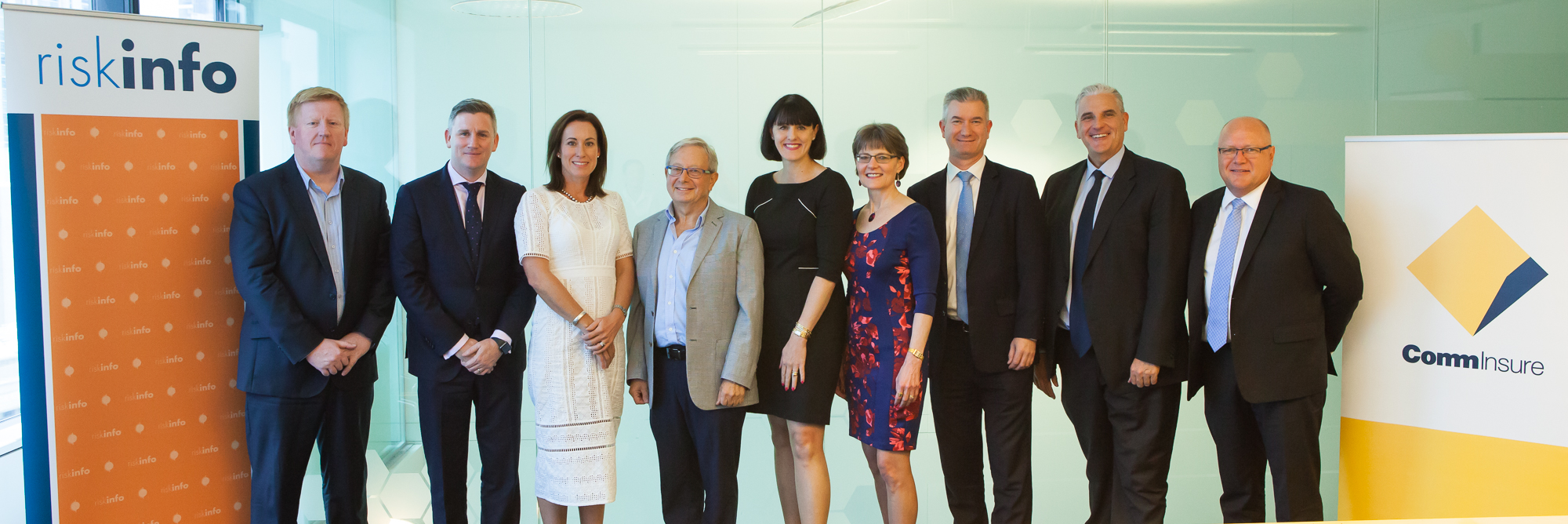Riskinfo joined with CommInsure, Phil Kewin from the AFA and Amy Florian from Corgenius to conduct a recent Industry Round Table to consider the grief process and associated issues from the point of view of the adviser, the claimant and the life company.
Table of contents (Click these links to move directly to those topics)
Part 2

Panelists (L – R)
- Jason Spits: Senior Journalist, Riskinfo, Editor, Riskinfo Magazine
- Ciaran Curley: Head of Claims Strategy, CommInsure
- Julie-Ann MacCormick: Senior Manager Rehabilitation Services, CommInsure
- Jossel Ginsburg: Kabel Financial Services
- Olivia Sarah-Le Lacheur: Head of Life Distribution, CommInsure
- Amy Florian: CEO, Corgenius
- Phil Kewin: CEO, Association of Financial Advisers, Co-host
- David Reed: The Retirement Advice Centre
- Peter Sobels: Publisher, Riskinfo
Who Cares for the Adviser – Back to top
Following the discussion on how advisers can build their level of empathy (see Part 1), the panel considered how advisers can deal with the emotional baggage they can pick up when dealing with grief or loss, and the first issue was to admit that even good, professional advisers can struggle from time to time. Florian described this reluctance to seek help as a common theme among people who are entrepreneurs and business owners, created by a belief that they should be able to cope with difficult people and situations.
“I’d like to see the idea of seeking help as an adviser positioned as a sign of strength. You seek help because you’re a strong person who wants to do better. You seek help because you want to serve your clients through times that you haven’t been trained to handle,” Florian said. She told the panel this approach would also apply when an adviser is going through a personal issue they may not want to discuss with colleagues and choosing to get help was a conscious and strong choice.
As a practicing adviser, Ginsburg sees the need for advisers to face up to the stresses of advice that come from clients and those that come from being a small business owner, particularly in recent years. “It’s a big problem because too many advisers are dropping out of the industry right now, including those with many years of experience, and they’re just throwing their hands up and walking away and that’s leaving a mass of clients without advice,” he said.
Advisers are often accidental counsellors and there is a limit to how much of that a person can take onboard
Aware of the pressures facing advisers from many quarters, the Association of Financial Advisers launched AFA Care in 2017. Kewin said the member-focused initiative was created to help advisers build skills around the difficult conversations they have with clients, as well as issues they may be having within their practices and personal lives.
“Advisers are often accidental counsellors and there is a limit to how much of that a person can take onboard and that emotional build-up has to go somewhere. Some people deal with it exceptionally well but for others it builds and builds,” Kewin said.
“In addition, there are the normal challenges of running your own business, and most self-employed advisers work that way because they want to control their own destiny. At the moment, many advisers don’t feel like they’re controlling their own destiny because they’re being told how they can be remunerated, what they’ve got to learn, how they can conduct their business,” he said.
Kewin said additional interpersonal and family issues also exist for advisers, and any combination of these pressures can bear down on an adviser, who is often perceived as the person everyone talks to but does not always have someone that can listen to them.
“There is a lot of angst out there at the moment. Advisers are feeling that they are going through a grief process because they’re not sure if they want to stay in this profession, because they’re not in control of it,” Kewin said.
Working in Tandem – Back to top
Curley sees similar emotional pressures applied to claims managers within the life industry, and the key role that advisers play in supporting clients throughout the claims experience is on par with the support offered by claims managers. He told the panel that many of the stories shared by advisers are very similar to those shared by claims managers and when they have those initial conversations with clients, and can provide some assurance, it is a moment of truth for the claims manager and a positive experience for the customer.
If there are similarities in the empathy offered by advisers and claims managers where does the work of one end and the other begin? Curley admits this question does not have a simple answer and depends on the claim being presented and the extent to which an adviser wants to be involved with the claim, a decision he said CommInsure is happy to respect.
“The steer we give our case managers is when we have that initial notification from the adviser, that is the time to ask the question, ‘How much do you want to be involved in this?’. The response can be different, but as we move into digital channels there will be opportunities for advisers and their support staff to go online, self-serve and check the status of a claim, which will lead to a more efficient and less time-consuming experience,” Curley said.
Advisers offer a vital role that a claims team cannot fulfil, according to MacCormick, who said the face to face interaction that comes through an adviser-client relationship is difficult to replicate by a claims team.
“A great example is somebody with an income protection claim for mental health. They might interact with a claims manager to get check the status of a payment or seek advice on a policy benefit but going to the adviser’s office regularly to have a cup of coffee is really important because they’re getting up, getting dressed, going out into the community and they feel connected,” she said.
“Sometimes the adviser’s role might, in the big scheme of things, look quite small but the significance for that person of participating actively in the community is so important, and for the adviser to set that time aside is as meaningful as getting the benefit paid,” MacCormick said.
There are also services life insurers are best equipped to provide to clients struggling with grief and loss. This is a result of life insurers having scale and being interconnected with other parts of the industry, MacCormick told the panel. She pointed to a network of more than 100 rehabilitation consultants, the Life Rehabilitation Forum, which she along with a handful of industry colleagues, set up more than a decade ago to exchange ideas and provide professional support to peers in the insurance sector.
MacCormick added that insurers, like CommInsure, have developed tools to connect clients with practical support for other life or health issues outside of a claim. “We found there’s no point in asking someone on claim following a knee reconstruction, ‘How can I help you with your rehabilitation?’ if they’ve told us they are living out of their car, or their most pressing issue is that a parent has just been diagnosed with Parkinsons and they don’t know how to support them.”
This approach reflects recent research conducted by the Beddoes Institute which found that when life insurance policy holders had a good claims experience, either through their adviser or through their insurer, they rated advice and life insurance as useful and beneficial and were far more willing to recommend it to their friends and family. Florian said research from the US-based Life Insurance Marketing and Research Association (LIMRA) found the same thing in that market as well.
“LIMRA did a study and found that among a very high proportion of the surviving family members, when there was any kind of a claim, if they were treated compassionately by the insurance company during that process they would be willing to work with that insurance company again, even if they’d never heard of them before. So, it shows how important compassionate support can be alongside the technical ability to process and pay a claim, and it has to be both,” she said.
Wrapping Up – Back to top
In bringing the conversation to a close, the panel finished off by considering what should advisers, and insurers, embrace and apply with clients during the grieving process. For Curley, it was continuing to listen to the “voice of the customer” and designing processes and services that respond to this critical voice.
“If we listen to the “voice of the customer” they can be our biggest advocates. When we’re connected to them, we’ve a much better chance of getting it right. Our customers have a huge amount to contribute if we’re prepared to listen. This is happening across the industry as we design processes and services that are right for the customer,” Curley said.
Building on this idea from Curley, Sarah-Le Lacheur added that the grief process requires advisers and insurers to walk alongside their clients for a time. “This is about companioning your clients, wherever they are, whatever stage they’re at. The role for us as insurers and the role for advisers is to identify where the client is at, what they need from us, and then tailoring our support to companion wherever they are.”
the best role an adviser can perform is to be the expert helping their client through the claims process
MacCormick stressed the importance of advisers and insurers working together and to maintain good communication while supporting a mutual client. “For those in claims it is important to have a communication loop and to be aware of what level of detail the advisers need so that they can be up to speed with what we’re doing to manage the claim and rehabilitation, including how we communicate,” she said.
“If advisers are having conversations with clients, which are sometimes difficult, it is clear they are caring about that person and want the details of what is going on with the claim and rehabilitation. So, for us, we need to be on top of information from the claims manager to the rehab team and make sure everybody is aware of the need to share that information when it’s been requested,” MacCormick said.
For those on the panel involved in providing advice, regular involvement with clients is a central plank to providing life insurance advice and delivering on the inherent promises that came with the initial advice. In his experience, Kewin sees good advisers doing this type of work and believes staying involved in the claims process achieves what advisers set out to do by providing support at the time they really need it.
“Advisers should not underestimate the importance of this type of work but we can get distracted by other requirements and shy away from being involved with claims. However, the best role an adviser can perform is to be the expert helping their client through the claims process and using empathetic skills to make clients and their families feel comfortable in the time they need it most. Being part of the grieving process, it’s not just a transaction, it’s actually a continuum of the relationship with the clients and their families,” Kewin said.
Advisers may sometimes feel left on the sidelines during the grieving and claims process as life insurers can run parallel to the adviser, according to Reed, but he sees advisers as being unique and essential to the process. “There’s no other profession that knows the person’s values, their vision, their family, their history, their dreams, their health, and everything that there is on the balance sheet as well,” Reed said, adding “learn to become comfortable with being uncomfortable and instead of shying away, lean in.”
being able to walk people through the technical aspects of insurance and underwriting and what policy suits them best is just table stakes. Don’t be afraid to pick up and work with the emotional side of advice
For Ginsburg, walking with a client through a tough time, and through a claim, is the reason he is in business and a reminder why he started to provide life insurance advice in the first place. “I wouldn’t want to be in business if I couldn’t get my claims paid but I am more interested in the satisfaction of dealing with a customer and getting them to understand what has been done through the process, what the insurance company has done for them at the same time,” he said, unsure why some of his advice peers are not engaged at claim time.
“It may be that they’re trying to save money by not being involved but they’re actually missing out on the biggest benefit of the business that brings you satisfaction. A successful claim is a powerful experience for client and adviser and we forget the reason why we’re in business unless we step up to the mark each time,” Ginsburg added.
Closing the discussion, Florian said that all the relevant stakeholders in the advice and insurance process – advisers, claims teams and rehabilitation centres – can, and should, learn about the grief process and grief support on a multiple of levels.
“You need to be aware of your clients and all the different times when they’re grieving so that you can walk them through whatever life throws at them, and life will always throw things at them,” Florian said.
“We had a baby boom many years ago so we’re going to have a death boom in the coming years. Before that we’re also going to have a diagnosis boom and a dementia boom, and there will be many other things that will happen because we become more susceptible to so many things as we age and we are aging,” she added.
“For this industry, being able to walk people through the technical aspects of insurance and underwriting and what policy suits them best is just table stakes. Don’t be afraid to pick up and work with the emotional side of advice and insurance because, at its core, your job is to help your clients live as fully as possible until they take their last breath,” Florian said.










